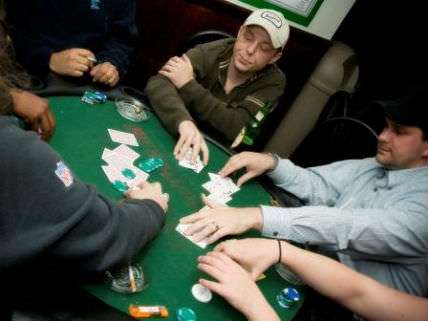Gambling Judge
Posted : admin On 7/24/2022A federal judge Monday in Washington, D.C., agreed to expedite a lawsuit that could block the Catawba Indians from building a casino near Charlotte. District of Columbia District Judge James. Judge Goldberg then went on to use the information contained in the casino win/loss statements against the taxpayer. For example, Dr. Merkin testified at trial that as a “professional” gambler he spent 47 out of 52 week-ends engaged in his secondary occupation for a total of at least 1,128 (assuming a minimum of 24 hours per week-end).
- Gambling Judge Court
- Gambling Judges
- Gambling Judge
- Gambling Judge Tv Show
- Gambling Judgement
- Gambling Judge Judy
Time behind bars in a federal prison
Louisiana judge Patrick Dejean is facing a three-year federal prison sentence after being found guilty of siphoning funds from debtors’ paychecks to feed his gambling addiction. The offenses took place from May 2009 until August 2016, during which period Dejean transferred more than $73,000 into his personal account.
US District Judge Mary Ann Vial Lemmon, who was in charge of the case, deemed Dejean guilty of 13 counts of mail fraud. The 40-year-old was also found guilty of three counts of making false statements to a financial institution.
Dejean transferred more than $73,000 into his personal account
Dejean will have to report to a minimum-security facility close to Pensacola, Florida on January 6, 2020. He will also have to serve three years under supervised release after leaving prison, as well as pay more than $73,000 in restitution to the victims of his theft.
Major win in the fight against public corruption
Leading the case was Western District of Louisiana District Attorney David Joseph. He said: “In this case, Justice of the Peace Dejean targeted some of the most vulnerable members of our society and stole their hard-earned wages, defrauded banks, and abused the trust placed in him by the public.”
Joseph went on to say that the three-year prison sentence should be a warning to any other public officials in the state who may be considering using their position for their financial benefit. He added that there will be no tolerance for such public corruption in Louisiana.
Dejean’s underhanded practices
The trial for the case took place in February over the course of seven days. The jury heard about how Judge Dejean was the judge for civil cases involving small claims. Such cases mainly involved creditors trying to obtain payments from their customers who were in arrears.
On receiving the garnishments, the judge would not send the funds to the creditors

If a judgment was ruled in favor of the creditors, Judge Dejean would tell the debtors’ employers to direct the wage garnishments straight to the Second Justice Court, where he was serving. On receiving the garnishments, the judge would not send the funds to the creditors. He primarily used the money to gamble at local casinos instead.
Another way Dejean was lining his pockets was by continuing to allow the employers of the debtors to send these wage garnishments, even when the total amount in arrears had been paid.
Dejean also borrowed money from a bank on behalf of the court, making false statements to do so. This money was also gambled away at casinos. As per Louisiana law, courts are not legally allowed to borrow money.
Judge Dejean’s defense argument
The prosecutors argued that Dejean had actually stolen $158,544, adding that the record-keeping within his court was “an utter nightmare”. The judge presiding over the case rejected this figure as the calculation did not sufficiently meet the burden of proof.
Dejean’s attorneys’ argument was that bank account irregularities happened as a result of the little bookkeeping experience the judge had.
Dejean admitted that his gambling addiction would cloud his judgment. His attorneys presented the extent of his addiction, with the judge withdrawing a total of $234,000 from casino ATMs in the area.
While the gambling judge took full responsibility for what he did, he maintained he did not like the way the prosecutors treated him.
CONCORD, N.H. (AP) — A federal judge ruled Monday that a law prohibiting interstate wagering applies only to sports gambling, setting aside a Justice Department opinion that some states feared would make online lottery activities including Powerball illegal and put the programs they fund at risk.
Judge Paul Barbadoro’s ruling comes in response to a suit filed by the New Hampshire Lottery Commission in February, which said a Justice Department opinion issued last year subjects its employees to prosecution, creates uncertainty about whether it should cease operations and could cost the state more than $90 million a year.
Data gathered by The Associated Press shows states would have been at risk of losing $220 million in net profits annually if the Justice Department had targeted single tickets sold online or more than $23 billion under the broadest interpretation that would have prohibited all lottery-related activities that use the internet, including popular games like Powerball.
“Today’s ruling is a historic victory for the State of New Hampshire and we are proud to have led this effort,” Gov. Chris Sununu said in a statement. “New Hampshire stood up, took action, and won — all to protect public education in our state.”
A spokesman for the Justice Department said it “is reviewing the decision and declines to comment further at this time.”
Matthew D. McGill, who represented the NeoPollard, Interactive, which operates the state’s online lottery, said the ruling will not be limited to New Hampshire. Michigan, New Jersey and Pennsylvania filed friend-of-the court briefs in this case.
“Because the court ‘set aside’ the Justice Department’s incorrect re-interpretation of the Wire Act, this ruling has nationwide impact,” he said in a statement. “Throughout the country, state lotteries and others in the gaming industry once again can rely on the Justice Department’s 2011 opinion that the Wire Act is limited to sports betting.”

But the Coalition to Stop Internet Gambling, which is backed by GOP megadonor Sheldon Adelson and filed an amicus brief in support of the Justice Department in the case, argued the ruling was limited and would likely be appealed.
Gambling Judge Court
“While we disagree with many of the views expressed in Judge Barbadoro’s ruling, we are happy that the scope of the opinion was confined to the parties involved,” the group said in a statement. “We are confident that other jurisdictions will see this issue very differently and our resolve to protect at-risk populations has only been strengthened by today’s decision.”
The case revolves around the Wire Act, a 1961 law meant to target the mob that prohibits interstate wagering. Decades later and with the internet ruling everyone’s lives, New York and Illinois asked the Obama administration whether selling lottery tickets online violated the law.

Gambling Judges

The department in 2011 concluded that online gambling within states that does not involve sporting events would not break the law. But the agency changed its mind in November, interpreting the act as applying to any form of gambling that crosses state lines, not just sports betting.
Gambling Judge

Gambling Judge Tv Show
But on Monday, Barbadoro said New Hampshire had the standing to sue and that the Wire Act was limited to sports gambling.
Gambling Judgement
Much of his argument came down to the interpretation of the language in the Wire Act, with the judge agreeing with the commission and the 2011 ruling that the law was meant for sports betting even though one clause only mentioned bets and wagers. The Justice Department argued the fact this clause didn’t mention sports betting by name meant the law could be interpreted more broadly.
Gambling Judge Judy
The judge also sided with the commission in determining it was at risk of potential prosecution, rejecting the Justice Department’s request to dismiss the lawsuit. The Justice Department had filed a memo in the case suggesting that its opinion didn’t address state lotteries and that it was in the process of determining whether the Wire Act applied. It said federal prosecutors had been advised not to enforce the November opinion until a decision was made.
But the state argued the prosecutions would still be possible and argued further delays in the case could complicate the state’s budget process, since a key source of revenue comes from lottery revenues.